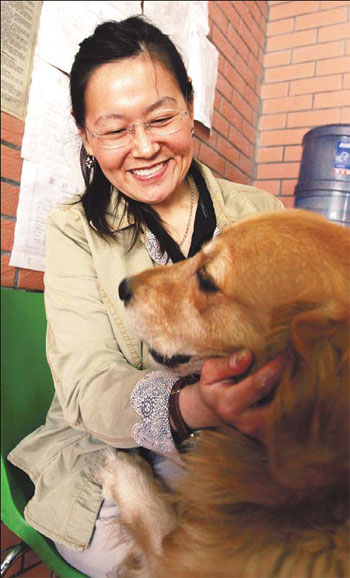|
|||||||||||
A Chinese-American entrepreneur pushes better health for pets - and rabies vaccinations for humans, Dan Shaw reports.
When Mary Peng first came to China in the early 1990s, a monkey taught her an important lesson.
 |
|
Mary Peng, who helped to found an international veterinary clinic in Beijing years ago, shares a moment with her own golden retriever, True. [Photo by Liu Zhe / China Daily] |
Her brush with a possible infection came in 1993, the second year she was in Beijing. She was then the managing director and chief representative of an international advertising firm.
One day, a couple of monkeys belonging to her neighbors came onto her apartment balcony by sneaking under her air-conditioning unit. When she tried to catch them, one bit her finger.
She was unaware that monkeys are among the most common carriers of rabies. She remembered being warned, though, about rats when she was a child in New York City.
As soon as possible, she started to get the series of five shots needed to give her immunity to the disease. Fortunately for her, the days of having to have the vaccine directly injected into the stomach had passed.
Peng could have the shots in her arm. And rather than all at once, they could be taken over the course of 28 days.
Yet there was still a large drawback to getting the shots after a bite. To ensure her body could fight off the disease before the vaccine took full effect, she had to get a dose of what is known as immunoglobulin, a natural substance that is both in short supply and expensive. A shot of it now can cost as much as 20,000 yuan ($3,100), she said.
Why hadn't she been vaccinated before coming to China? Peng said the need for vaccination may seem obvious to many - especially this week, when World Rabies Day on Sept 28 generates a certain amount of publicity. But few expatriates thought about the danger posed by rabies 20 years ago.
More than a decade later, Peng helped to found International Center for Veterinary Services, an organization meant to ensure pets in this country can receive medical treatment that meets international standards. In time, she became a leader in the fight against rabies in China.
To residents of developed countries, the disease has long been nothing but a remote threat.
 |
The situation is vastly different in China. Here, rabies kills as many 3,000 as people a year, Peng said.
And household dogs are among the most common carriers. In big cities such as Beijing, Peng estimated, only 30 percent to 50 percent of dogs are likely to have been vaccinated. The inoculation rate is far lower in the countryside, where, according to estimates, only 3 percent to 10 percent of all dogs are likely to have received rabies shots.
Such figures have led Peng to be cautious around animals she encounters outside city limits. She advises travelers to keep their distance from cats and dogs found out in the countryside, even if they appear to be pets.
Caution can be taken too far, though, she said.
"We shouldn't live in fear," she said. "You should not be afraid of your food here, and you should not be afraid of every dog or cat that crosses your path."
Still, the lack of widespread vaccinations means that no effective barrier against the disease has been established in China, as has happened in many Western countries. That puts Chinese residents at a far greater risk of infection.
Worries about rabies became great enough toward the last few years of the "cultural revolution" (1966-76), that the Beijing government decided to ban dogs from the city's central districts. When the ban was lifted more than a decade later, Chinese families that wanted to keep a dog were faced with an extraordinary expense - 5,000 yuan for registering a pet with the government and 2,000 yuan for renewals every year afterward.
With the annual income for many Chinese families then amounting to only several thousand yuan, the rule in effect meant that only the rich could afford the pets - or at least afford to have them registered.
Statistics for those years show that the city was then home to about 140,000 dogs.
When, in the mid-2000s, the registration fees were lowered to 1,000 yuan for an initial registration and 500 yuan for annual renewals, the number of registered dogs quickly rose to 410,000. Today the number of registered dogs in the capital is more than 1 million.
Peng says dog owners who register their animals get more than the satisfaction of knowing they have complied with the law. They are also entitled to free rabies vaccinations.
She says whether the pet owners come to the International Center for Veterinary Services or go elsewhere for the shots, they should choose a place the government has certified to sell vaccines. Buying from such places is safe, she says, because the government takes strict steps to ensure that they only buy legally registered vaccines. Even so, hundreds of small operators still sell unapproved products. Those vaccines, she warned, are doubly dangerous because they can be ineffective while giving pet owners the false notion that they are protected.
Looking back at how many dogs suddenly became registered in Beijing after the city's dog ban was lifted, Peng says that is evidence of the pets' pull on their owners' affections.
"It is very hard to negate human emotion, to negate the human-animal bond," she says. "You can't legislate this away."
Her love for the cat that she brought with her to Beijing was part of the inspiration to help found the International Center for Veterinary Services.
Back in the 1990s, if she wanted to have the animal given good medical care for a serious condition, she had to fly it back to the United States.
"But what about everybody else here?" she says. "That wasn't solving the problem for anybody. I wanted to be a part of something that would make a real contribution to China, which is now my permanent home."
You can contact the writer at [email protected].
Hot Topics
Libya conflict, Gaddafi, Oil spill, Palace Museum scandal, Inflation, Japan's new PM, Trapped miners, Mooncake tax, Weekly photos, Hurricane Irene
Editor's Picks

|

|

|

|

|

|







